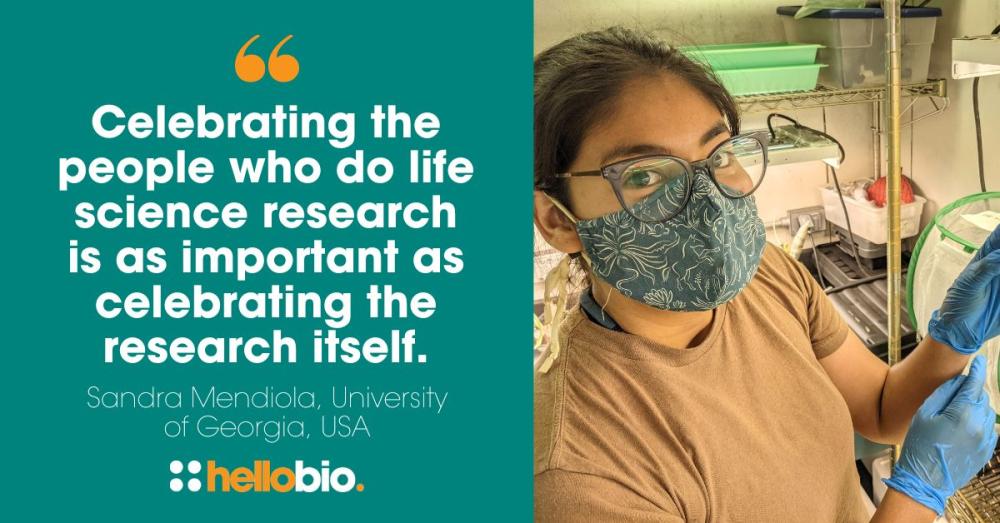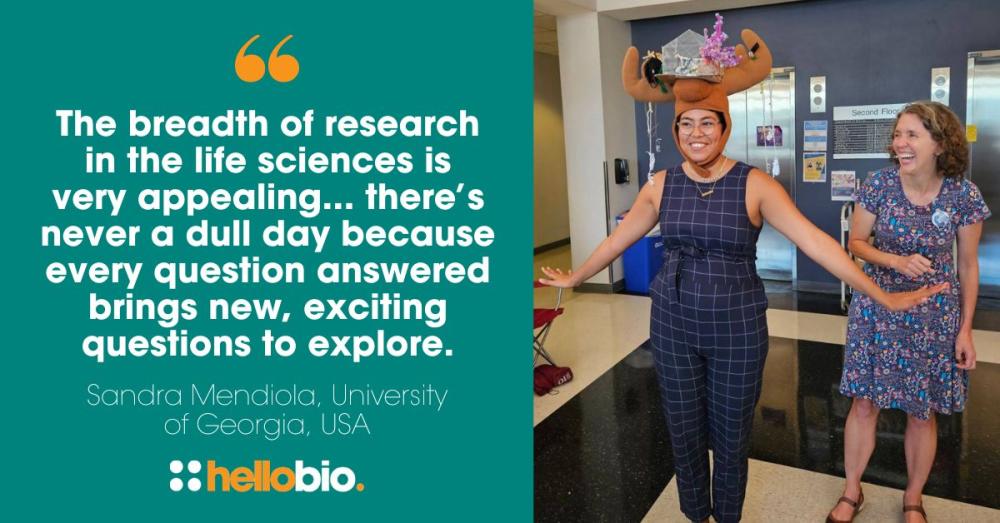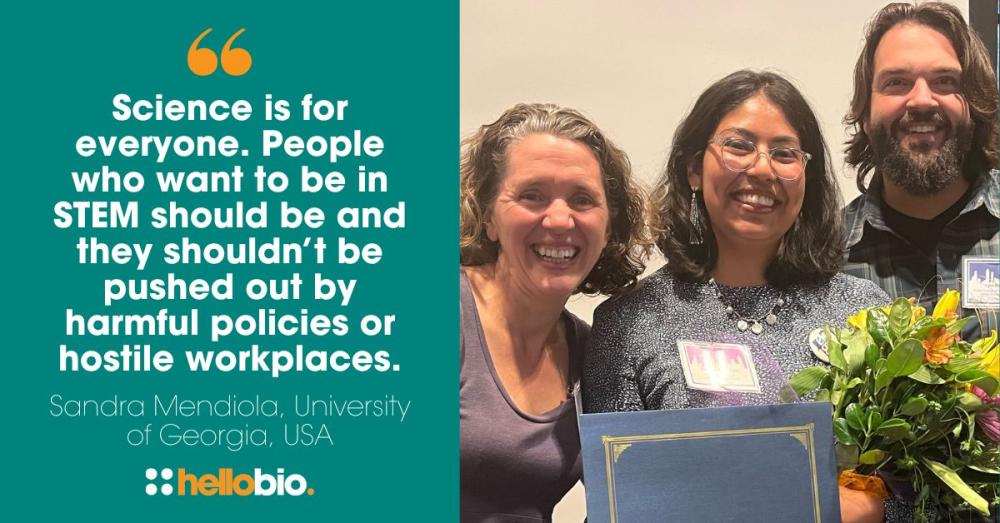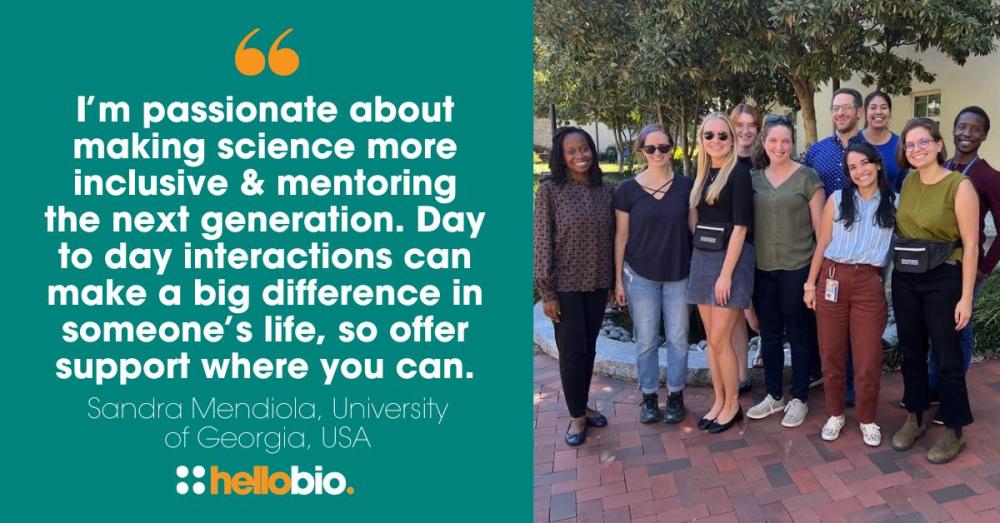Meet Our Lab Heroes Awards™ 2023 Highly Commended Nominees: Sandra Mendiola
It’s time to meet another of our Lab Heroes Awards™ 2023 Highly Commended nominees! Sandra Mendiola was nominated by her colleague Kim Hoang who described her as a ‘pillar for those in need’ and a ‘champion for inclusion and belonging in STEM’. Sandra was one of three nominees selected by our judging panel as ‘highly commended’ in the Lab Scholar category of our annual awards.
Sandra Mendiola is a National Science Foundation (NSF) Postdoctoral Fellow in the Entomology Department at the University of Georgia, USA. She recently began a new role at the Vogel lab, investigating the impact of bacterial symbionts on the ability of triatomine bugs to harbor trypanosome parasites. She earned her PhD in Population Biology, Ecology, and Evolution from Emory University where she was a part of the Gerardo and Civitello labs in the Department of Biology. She began graduate school as a NSF Graduate Research Fellow and was later awarded a predoctoral fellowship from the United States Department of Agriculture to pursue her research. Sandra’s research focused on how symbiotic bacteria altered the vectoring capabilities of squash bugs, agriculturally important pests of cucurbit crops. Her research leveraged methods in transcriptomics, microbial ecology, and mathematical modeling to paint a full picture of how symbionts interface with squash bugs and the consequences of those interactions on pathogen transmission at the population-level. Sandra’s work in this system earned her a Rising Star Award from the Entomological Society of America.
Throughout her time at Emory, she was an advocate for students, particularly in matters of equity and inclusion. These efforts earned her the Kharen Fulton Diversity Graduate Award as well as the Graduate Student Award for Inclusive Excellence in the Natural Sciences.
We had a great conversation with Sandra about her current research work, the importance of celebrating life science researchers, and her advocacy for inclusion and belonging in STEM.
Congratulations, Elia! How did it feel to find out that your colleague had nominated you as their Lab Hero?
My nominator, Kim, has been a pillar of support for me throughout graduate school so I was really touched to learn she had nominated me as her Lab Hero. I’ve always admired Kim’s intelligence and work ethic, so I was over the moon to find out that she regards me so highly.
How did it feel when you found out our judges had chosen you as 'Highly Commended'?
I’m honored to be recognized alongside so many amazing scientists! I never thought of myself as a lab hero, so I’m blown away by being recognized. I'm proud to have made a positive impact on my lab and my colleagues.
Why do you think it’s so important to celebrate life science researchers, and what more could be done to show life scientists recognition?
Celebrating the people who do life science research is as important as celebrating the research itself. Life scientists work in a world of unknowns. Biology has few universal laws and as biologists we deal with lots of variation. Tackling these problems requires incredible resilience. Recognizing the scientists behind innovations in the life sciences reaffirms our collective commitment to scientific research. It also helps demystify the research process and lets new generations know that these career paths exist and are achievable.
Did you always want to be a scientist when you were younger, and if so, why?
I grew up in a family of migrant farmworkers and was the first in my family to go to college. I never knew that being a scientist was a viable career path until I started doing research in college. Looking back now, I think the investigative aspect of scientific research always appealed to me so it’s not surprising I took it up later in life.
What do you enjoy most about working in STEM?
One of my favorite parts of working as a scientist is the variety of things I’m able to do. I enjoy the puzzle-solving aspect of tackling a research question and incorporating multiple methods to get an answer. The breadth of research in the life sciences is very appealing to me. There is never a dull day because every question answered brings new, exciting questions to explore.
Can you tell us a bit more about what you're working on in the lab at the moment?
I wrapped up my PhD at Emory University in December and have just started a new postdoctoral position at the University of Georgia. I haven’t launched any big projects yet, but I’ll be studying tripartite interactions between kissing bugs, their symbiotic bacteria, and the trypanosome parasites they vector to humans.
What does a typical day in the lab look like for you?
Between some computational projects, finishing up my dissertation, and keeping up with emails, for the last few months, my typical lab day has involved sitting at the computer. This was quite daunting for me since I generally enjoy doing benchwork. I mix it up by alternating between coding, which can present some nice debugging puzzles, and writing. Typically, I’ll also take some time to talk to my labmates and inquire about their work. My favorite discussions involve brainstorming rather elaborate experiments that someone might eventually get to.
What do you think are the biggest challenges facing life scientists at the moment?
I think the effective communication of scientific findings to the general public is one of the biggest challenges facing life scientists. Our training prepares us to write for a scientific audience, but communicating to a lay audience brings unique challenges. Nevertheless, it is important to master this style of communication if we want to convey the importance of our research to our stakeholders and avoid misinterpretation of our findings. People have access to unprecedented amounts of information, and it has become clear through the Covid-19 pandemic that we as scientists need to work to curb the spread of scientific misinformation.
Your colleague praised your advocacy for inclusion and belonging in STEM. Why is this important to you, and what more could be done to encourage marginalized groups to engage with the world of STEM?
Science is for everyone. My own journey in STEM would not have been possible without professors who recognized my potential and advocated for me. Historically underrepresented groups face many hurdles in higher education. Being in a community with others who were familiar with my struggles in and outside of the classroom provided much needed support and validation. Advocacy and inclusion work in STEM is important to me because I want to remove as many barriers to success for others as possible. People who want to be in STEM should be and they shouldn’t be pushed out by harmful policies or hostile workplaces. I think the best way to engage more people in STEM is to allocate more resources to STEM education. Representation is important and it definitely lets people know about potential career paths, but we need programs that offer more direct guidance and assistance for achieving those goals, especially in rural and resource poor areas where regular access to professionals in STEM careers may be rare.
What key piece of advice would you give to a younger scientist just starting out in their career?
Be comfortable with being uncomfortable. Sometimes you’ll feel like you’re flying by the seat of your pants, especially when pursuing new research interests. It’s normal and expected when you’re learning new skills and breaking new ground.
How do you see your career developing in the future/where do you see yourself in 10 years?
In ten years, I hope to be heading my own research lab focusing on vector-borne disease ecology. I hope to be doing more applied research and working directly with stakeholders to test and implement symbiont-mediated vector control measures. I’d also love to be in a place where I can mentor students and help them develop their own research interests and launch their careers.
Which scientists working today do you admire the most?
Dr. Hassan Salem and Dr. Aileen Berasategui are the insect-microbe symbiosis dream team. They were some of the first postdocs I met in grad school. In my first few years as a graduate student, they were veritable fountains of wisdom. Their passion and intelligence always blew me away and they’ve continued to support me in my research even after they moved on from the lab.
What’s your favourite science joke?
This one is for the entomologists:
Q: Given the choice between a big weevil and a small weevil, which do you prefer?
A: I prefer the lesser of two weevils.
Is there anything else you would like to tell us, eg. specific issues or initiatives in science that you are involved with or are passionate about?
I’m passionate about making science more inclusive and mentoring the new generation of scientists. The work of making science inclusive can take many forms and every little bit helps. I encourage others to reflect on their own lab practices to make sure people aren’t being left behind. Day to day interactions can make a big difference in someone’s life, so offer support where you can and, most importantly, never stop learning.
________________________________
Thank you so much for speaking to us Sandra! And congratulations once again on being highly commended!
Connect with Sandra and the team at the Vogel Lab:
- X (Twitter): @SandraYMendiola
- X (Twitter): @The_Vogel_Lab
- LinkedIn: Sandra Mendiola
- Website: mendiolab.com
- Lab website: https://site.caes.uga.edu/vogellab/
And you can meet our other Lab Heroes Awards™ 2023 prize-winners here.
________________________________
If you enjoyed this article, why not check out the other resources available on our blog. We are passionate about supporting life scientists including early career life scientists and PhD students - with really low-priced reagents, antibodies and biochemicals, early career scientist grants, and resources to help with both personal and professional development. We know how tough it is - so we hope you find these helpful!
More General Support for Life Scientists
For advice on wellbeing, dissertations, presenting at conferences, wellbeing, PhD support, networking and lots more, we have a huge range of articles to help - just click below:
Save up to 50% on our high purity reagents...
When you get to the stage of planning your experiments, don't forget that we offer a range of low-cost, high-purity agonists, antagonists, inhibitors, activators, antibodies and fluorescent tools (yes - they really are around half the price of other suppliers!) You can use our Quick Multi-Search Tool to search for lots of products in one go, and the range includes:
- Enzyme inhibitors and activators
- Chemogenetic ligands
- Ion channel modulators
- GPCR & ionotropic receptor ligands
- Cell biology reagents & biochemicals
Technical resources
Try our Molarity Calculator: a quick and easy way to calculate the mass, volume or concentration required for making a solution.
Try our Dilution Calculator: an easy way to work out how to dilute stock solutions of known concentrations
We also offer a comprehensive range of technical resources including antibody protocols and methods, product guides and mini-reviews:
And finally, don't forget to check back in with our blog regularly for our latest articles. If there’s something you’d love to contribute to the community, whether that’s an interview or article, drop us a line at hello@hellobio.com
---
























